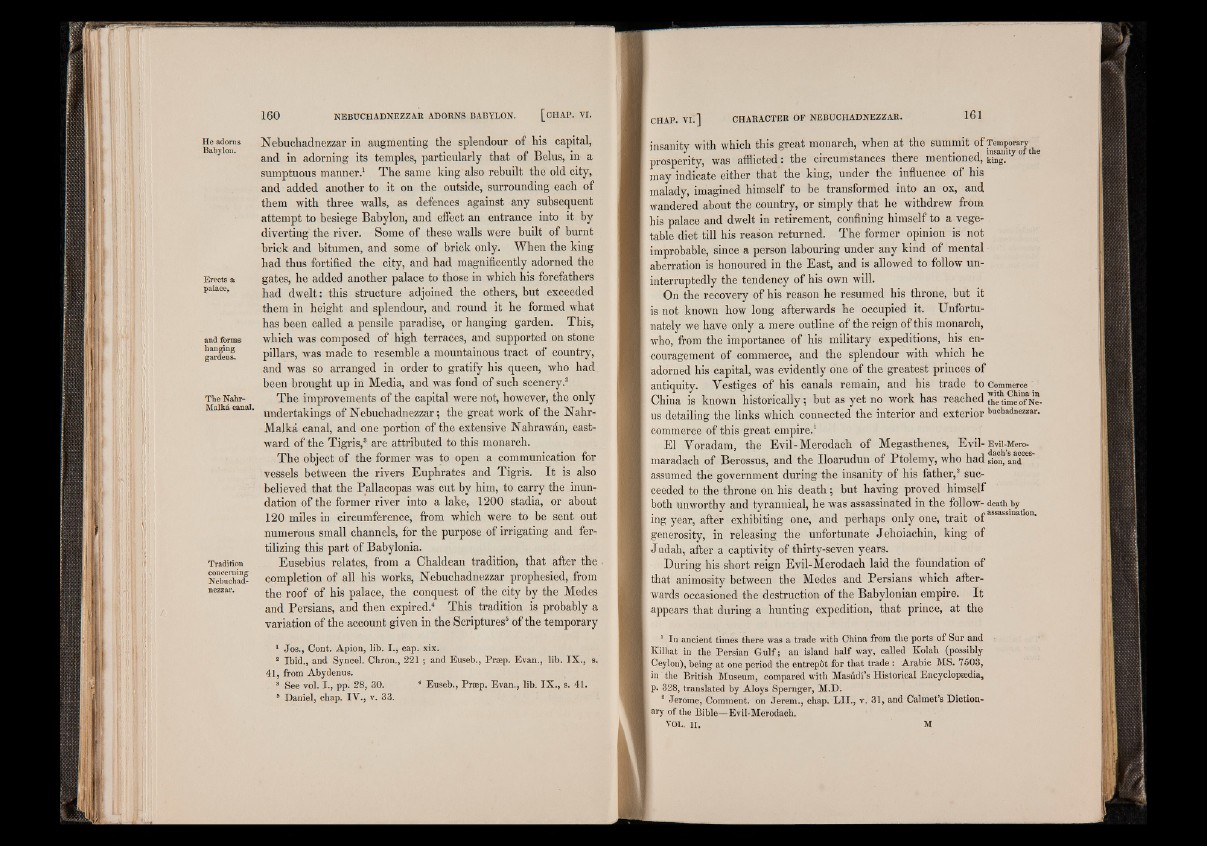
He adorns
Babylon.
Erects a
palace,.
and forms
hanging
gardens.
The Nahr-
Malká canal.
Tradition
conce niing
Nebuchadnezzar.
Nebuchadnezzar in augmenting the splendour of his capital,
and in adorning its temples, particularly that of Belus, in a
sumptuous manner.1 The same king also rebuilt the old city,
and added another to it on the outside, surrounding each of
them with three walls, as defences against any subsequent
attempt to besiege Babylon, and effect an entrance into it by
diverting the river. Some of these walls were built of burnt
brick and bitumen, and some of brick only. When the king
had thus fortified the city, and had magnificently adorned the
gates, he added another palace to those in which his forefathers
had dwelt: this structure adjoined the others, hut exceeded
them in height and splendour, and round it he formed what
has been called a pensile paradise, or hanging garden. This,
which was composed of high terraces, and supported on stone
pillars, was made to resemble a mountainous tract of country,
and was so arranged in order to gratify his queen, who had
been brought up iri Media, and was fond of such scenery.2
The improvements of the capital were not, however, the only
undertakings of Nebuchadnezzar; the great work of the Nahr-
Malka canal, and one portion of the extensive Nahrawan, eastward
of the Tigris,3 are attributed to this monarch.
The object of the former was to open a communication for
vessels between the rivers Euphrates and Tigris. It is also
believed that the Pallacopas was cut by him, to carry the inundation
of the former river into a lake, 1200 stadia, or about
120 miles in circumference, from which were to be sent out
numerous small channels, for the purpose of irrigating and fertilizing
this part of Babylonia.
Eusebius relates, from a Chaldean tradition, that after the
completion of all his works, Nebuchadnezzar prophesied, from
the roof of his palace, the conquest of the city by the Medes
and Persians, and then expired.4 This tradition is probably a
variation of the account given in the Scriptures5 of the temporary
1 Jos., Cont. Apion, lib. I ., cap. xix.
2 Ibid., and Syncel. Chron., 221 ; and Euseb., Prsep. Evan., lib. IX ., s.
41, from Abydenus.
8 See vol. I ., pp. 28, 30. 4 Euseb., Praep. Evan., lib. IX ., s. 41.
8 Daniel, chap. IV ., v. 33.
I
the
CHAP. V I.]
insanity with which this great monarch, when at the summit of Temporary
J , ' , • , j insanity of I prosperity, was afflicted: the circumstances there mentioned, king.
may indicate either that the king, under the influence of his
malady, imagined himself to be transformed into an ox, and
wandered about the country, or simply that he withdrew from
his palace and dwelt in retirement, confining himself to a vegetable
diet till his reason returned. The former opinion is not
improbable, since a person labouring under any kind of mental
aberration is honoured in the East, and is allowed to follow uninterruptedly
the tendency of his own will.
On the recovery of his reason he resumed his throne, but it
is not known how long afterwards he occupied it. Unfortunately
we have only a mere outline of the reign of this monarch,
who, from the importance of his military expeditions, his encouragement
of commerce, and the splendour with which he
adorned his capital, was evidently one of the greatest princes of
antiquity. Vestiges of his canals remain, and his trade to Commerce
China is known historically; but as yet no work has reached the time of Neus
detailing the links which connected the interior and exterior buchadnezzar.
commerce of this great empire.1
El Voradam, the Evil-Merodach of Megasthenes, Evil-Evii-Mero-
maradach of Berossus, and the Iloarudun of Ptolemy, who had SioU, and
assumed the government during the insanity of his father,2 succeeded
to the throne on his death; but having proved himself
both unworthy and tyrannical, he was assassinated in the follow- death by • * i l l • nDCGflccinai mg year, after exhibiting one, and perhaps only one, trait ot
generosity, in releasing the unfortunate Jehoiachin, king of
Judah, after a captivity of thirty-seven years.
During his short reign Evil-Merodach laid the foundation of
that animosity between the Medes and Persians which afterwards
occasioned the destruction of the Babylonian empire. It
appears that during a hunting expedition, that prince, at the
assassination.
1 In ancient times there was a trade with China from the ports o f Sur and
Kilhat in the Persian G u lf; an island half way, called Kolah (possibly
Ceylon), being at one period the entrepôt for that trade : Arabic MS. 7503,
j in the British Museum, compared with Masudi’s Historical Encyclopaedia,
! p. 328, translated by Aloys Spernger, M.D.
2 Jerome, Comment, on Jerem., chap. L IL , v. 31, and Calmet’s Diction-
j ary of the Bible—Evil-Merodach.
VOL. II , M